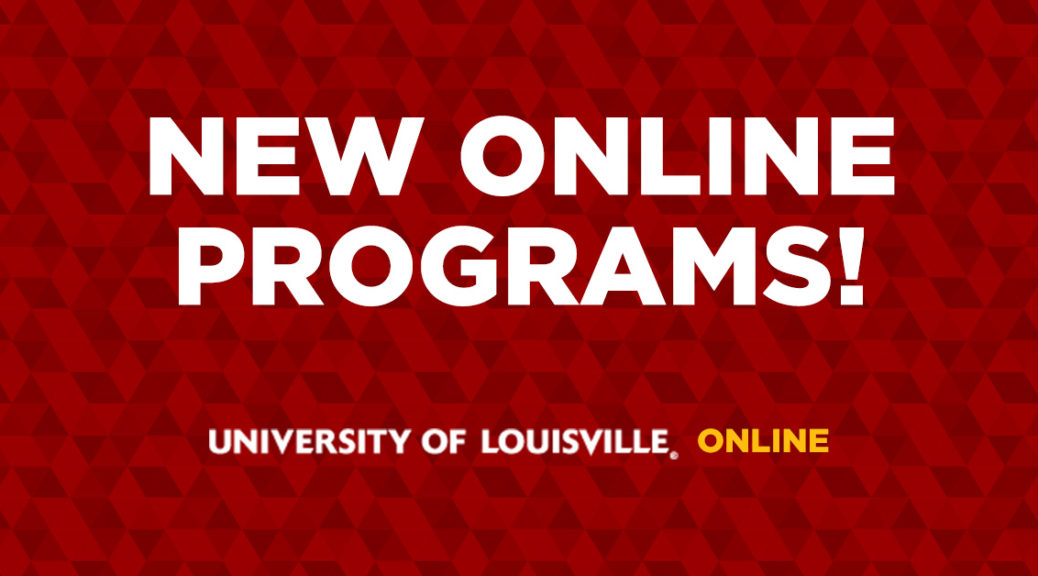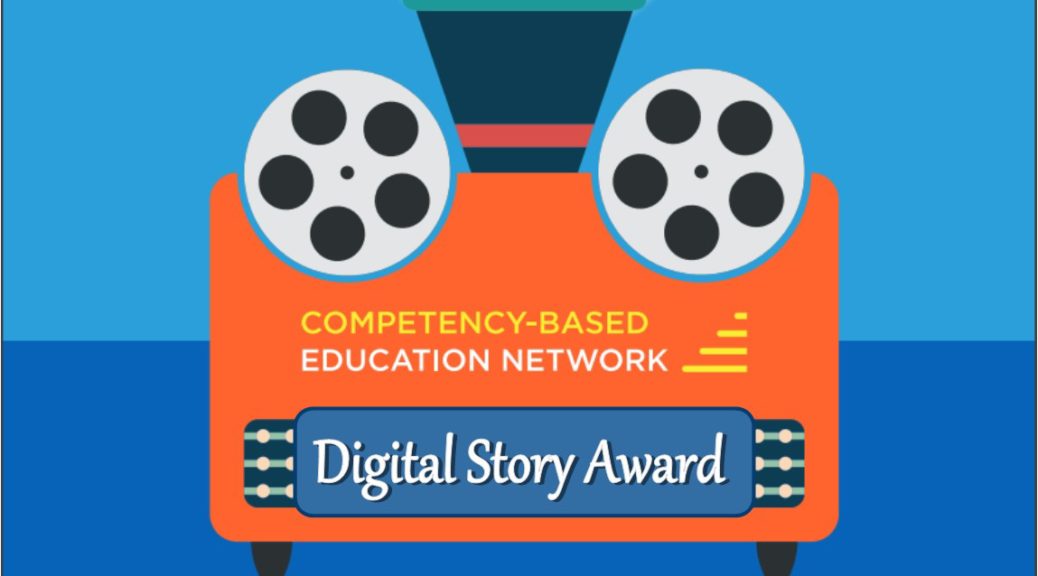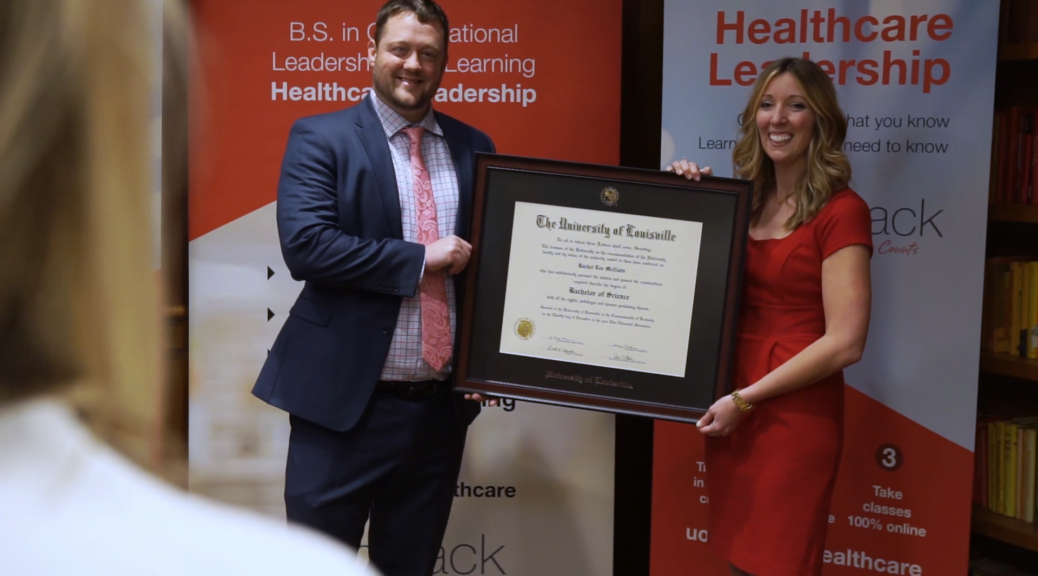
Engineer the future: new programs in Materials & Energy Sciences and AI for Medicine



The story of Rachel McClain, first graduate of UofL’s Healthcare Leadership competency-based education (CBE) program, won first place in the national CBExchange Digital Storytelling contest. The video was produced by UofL Online marketing team led by Laura Dorman, marketing manager, in partnership with VideoBred Production, and with the contribution of Dr. Lee Bewley, BS OLL – Healthcare Leadership, CBE program director.
The Competency-Based Education Network (C-BEN) is a group formed of colleges and universities working together to address shared challenges to designing, developing and scaling competency-based degree programs across the United States. C-BEN brings together educators and staff who work in competency-based education and witness the transformative and innovative nature of CBE on a daily basis. Many have seen first-hand the ways CBE impacts students’ lives—enabling them to fulfill lifetime goals and pursue new opportunities.
To help others see the power of CBE, C-BEN issued a call to share these success stories. The CBExchange Digital Storytelling contest evaluated short digital stories combining video, photography, music, animation, etc., that focused on the impact of CBE on students’ journey and opportunity for higher achievements. Winning first place, Rachel’s story stood out as the most powerful and well-presented.
Her success story also launched the “What’s Your Why?” video testimonial series, created by the UofL Online marketing team. This series aims to share inspirational student and faculty stories with potential UofL Online students, the online learners community-at-large, employers and beyond.
Read more about Rachel’s journey at uofl.me/cbengold.

Rachel McClain didn’t know what her life was missing—not until she almost lost her chance to find out.
After unexpectedly suffering a stroke, Rachel realized she wanted to live life to the fullest and achieve more. She found the perfect place to start at the University of Louisville. Earning a degree 100% online in Healthcare Leadership set Rachel up for career advancement and personal fulfillment.
Rachel started her education at a local community college right out of high school. When she got a full-time job in sales that didn’t require a college education, earning what she believed was decent income, she decided not to finish her degree.
Years later, she found herself passed up for jobs in lieu of others who had a bachelor’s degree. Despite having the necessary experience and intellect, her lack of a college diploma held her back from career progression.
Rachel’s mindset then was to live in the moment. As a result, she rarely found herself thinking much about the long-term and continuing her education wasn’t really on her mind.
However, when life intervened, her perspective changed. After recovering from a stroke, Rachel knew it was time to go back to school.
“I woke up one morning and it was really blurry. I ended up losing feeling in my face and ultimately, I had a stroke. I was debilitated for about six months. I went to occupational speech and physical therapy, where I learned to walk again, talk again and have motor skills again. And that’s when I really took the turn and said no time like the present. It’s time to go back to school.”
Continuing her education and finishing the degree she previously started became her primary mission.
Rachel initially enrolled in a traditional four-year program, but it didn’t feel quite right. When she discovered the Healthcare Leadership (HCL) program, the first competency-based education degree delivered 100% online at UofL, she knew she’d found the perfect fit. Not only did the HCL program allow her to balance work and education, but it gave her the chance to capitalize on her decade-long professional experience and helped her reach the finish line much faster.
“[The Healthcare Leadership program] was everything I wanted. It instantly made me smile. It was perfect.”
Competency-based education (CBE) looks at prior education and/or working experience and rewards students with course credits for mastered competencies. In other words, students can test out of classes where they are knowledgeable and immediately start another class where they learn new concepts and skills. This method allows students to progress toward degree completion at a pace that fits their learning style.
For Rachel, this model allowed her to graduate with her bachelor’s degree in just about 10 months.
Since graduating from the healthcare leadership program, Rachel has been promoted within her organization and her life has changed for the better. Her experience as an online student and the degree she earned allows her to shine and gives her confidence to pursue even bigger dreams for her future.
“To someone that is considering this degree: take the leap. There’s no time like the present and I think this program provides so much flexibility that it’s kind of a no brainer. Don’t put it off until tomorrow. I really think that this program has only given me benefits in my life and I would recommend it to anyone.”
Although Rachel worried about the commitment she had to make to finish her degree, as well as having another stroke during the process, she knew she couldn’t let anything hold her back. With the support and encouragement of her friends and family, Rachel took the leap to better her future—and it paid off.
This is Rachel’s story. Inspired by a shift in perspective, she went back to school to change her life and further her career. This is her why!
Check out our YouTube page to hear testimonials from other UofL Online programs and students, or read more student success stories here.
University of Louisville offers various degrees and certificate programs 100% online. These programs deliver quality online education to non-traditional students who are not able to come to a physical campus and want to earn a college degree or certificate to start or advance their career.